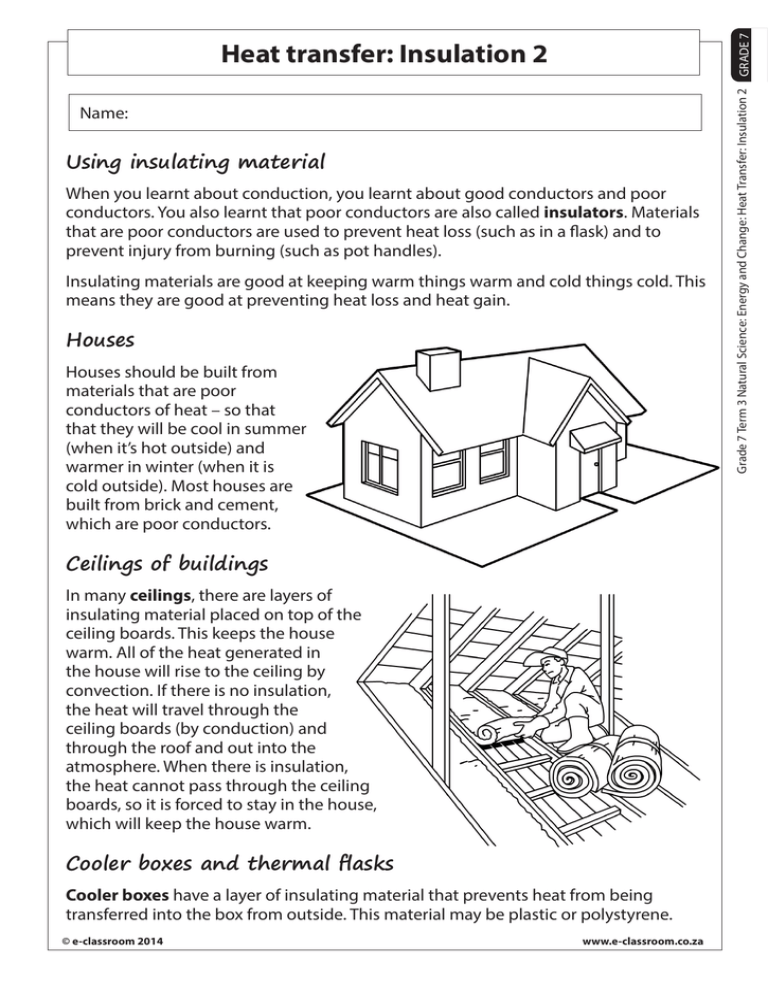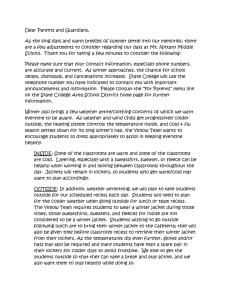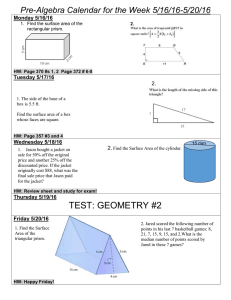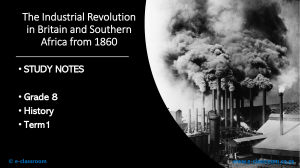Grade 7 Heat Transfer & Insulation Worksheet
advertisement

GRADE 7 Name: Using insulating material When you learnt about conduction, you learnt about good conductors and poor conductors. You also learnt that poor conductors are also called insulators. Materials that are poor conductors are used to prevent heat loss (such as in a flask) and to prevent injury from burning (such as pot handles). Insulating materials are good at keeping warm things warm and cold things cold. This means they are good at preventing heat loss and heat gain. Houses Houses should be built from materials that are poor conductors of heat – so that that they will be cool in summer (when it’s hot outside) and warmer in winter (when it is cold outside). Most houses are built from brick and cement, which are poor conductors. Ceilings of buildings In many ceilings, there are layers of insulating material placed on top of the ceiling boards. This keeps the house warm. All of the heat generated in the house will rise to the ceiling by convection. If there is no insulation, the heat will travel through the ceiling boards (by conduction) and through the roof and out into the atmosphere. When there is insulation, the heat cannot pass through the ceiling boards, so it is forced to stay in the house, which will keep the house warm. Cooler boxes and thermal flasks Cooler boxes have a layer of insulating material that prevents heat from being transferred into the box from outside. This material may be plastic or polystyrene. © e-classroom 2014 www.e-classroom.co.za Grade 7 Term 3 Natural Science: Energy and Change: Heat Transfer: Insulation 2 Heat transfer: Insulation 2 GRADE 7 Grade 7 Term 3 Natural Science: Energy and Change: Heat Transfer: Insulation 2 Spongy or foamy materials, like polystyrene, are good insulators because they have bubbles of air trapped in their structure. This helps to prevent heat from passing through them. Thermal flasks can be used for hot or cold drinks. They also have a layer of insulating material, but they use an even more powerful method of insulation called a vacuum. There is a space between the outer layer of material and the inner layer. This space is sealed and is a vacuum. (If you remember from our discussion about how heat is transferred by the sun, you will remember that we said that it is difficult for heat to be transferred across space because space is a vacuum – there is not air through which heat can travel.) Clothing When you are cold, your body responds by making your hair stand up. Your hair traps the warm air close to your skin and warms you up. Clothes are made so that they can do a similar thing by keeping the warmth our body produces, instead of allowing it to be transferred to the surroundings. Some clothes, like coats, are made from a thick weave of fabric that does not allow the warm air to travel through it away from your body. Other clothes are made from a lighter or thinner weave of fabric, such as fleece or wool. This fabric traps the warm air our bodies produce and prevents it from escaping. Activity 1: Answer these questions: 1) Read this scenario and answer the questions that follow. Jack and his family live in an informal settlement. Their home is made of corrugated iron. In summer, their house is very hot, and in winter, it is very cold. a) What is Jack’s house made of? __________________________________________________________________ b) Is this material a good insulator or a good conductor of heat? __________________________________________________________________ c) Why is Jack’s house very hot in summer and very cold in winter? __________________________________________________________________ © e-classroom 2014 www.e-classroom.co.za _________________________________________________________________ _________________________________________________________________ 2) Read this scenario and answer the questions: Caleb is a firefighter. He and his team get called out to a building that is on fire. He puts on his bunker gear, including his pants and jacket made from special material. He enters the building with his gear on and retrieves a person who is trapped in the fire. He pulls her out of the building; she is conscious, but in shock. Caleb takes off his jacket and wraps it around her. a) Why is it important for Caleb to wear his special clothing when entering a building on fire? __________________________________________________________________ __________________________________________________________________ __________________________________________________________________ b) Explain how the clothing protects him from the heat of the fire in the building. __________________________________________________________________ __________________________________________________________________ c) Why does Caleb put the jacket around the person he rescued? _______________________________________________________________ _______________________________________________________________ d) Explain how the jacket prevents the person from getting cold (as a result of shock). _______________________________________________________________ _______________________________________________________________ © e-classroom 2014 www.e-classroom.co.za GRADE 7 Grade 7 Term 3 Natural Science: Energy and Change: Heat Transfer: Insulation 2 What could Jack and his family do to prevent heat gain in summer and heat loss d) in winter. (Tip: Use your knowledge about insulating materials.) GRADE 7 Activity 1 1) Read this scenario and answer the questions that follow. Jack and his family live in an informal settlement. Their home is made of corrugated iron. In summer, their house is very hot, and in winter it is very cold. a) What is Jack’s house made of? Corrugated iron b)Is this material a good insulator or a good conductor of heat? It is a good conductor of heat. c) Why is Jack’s house very hot in summer and very cold in winter? Jack’s house has no insulation. The corrugated iron transfers heat out of his home in winter, causing it to be very cold. It transfers heat into his home in summer, making the house very hot. d)What could Jack and his family do to prevent heat gain in summer and heat loss in winter. A layer of insulating material needs to be put inside Jack’s house, lining the roof and walls. Materials may include newspaper, cardboard or polystyrene. (This can be used as a research question or project for the learners to complete. Have them investigate the advantages and disadvantages of using different materials. Have them test which materials would be most effective, economical and convenient. Have them build a model of the house with their preferred insulation technique included. There are many interesting and innovative ways this can be done – visit the link below to see examples: http://blog.greenhomebuilding.com/2007/12/using-earthbags-as-ceilinginsulation.html 2) Read this scenario and answer the questions: Caleb is a firefighter. He and his team get called out to a building that is on fire. He puts on his bunker gear, including his pants and jacket made of special thick material. He enters the building with his gear on and retrieves a person who is trapped in the fire. He pulls her out of the building; she is conscious but in a lot of shock. Caleb takes off his jacket and wraps it around her. © e-classroom 2014 www.e-classroom.co.za Grade 7 Term 3 Natural Science: Energy and Change: Heat Transfer: Insulation 2 Answer Sheet The special gear protects him from the heat, the flames and any debris (fallen objects, broken windows, etc.) b) Explain how the jacket protects him from the heat of the fire in the building. The fabric of the jacket and pants is a good insulator. It does not allow the heat to be transferred through to his body. This protects him from the heat of the fire. c) Why does Caleb put the jacket around the person he rescued? He puts the jacket around the person to keep them warm. d) Explain how the jacket prevents the person from getting cold (as a result of shock). As the jacket is a good insulator, it traps the person’s body heat which does not allow body heat to be transferred through the jacket to the surroundings. © e-classroom 2014 www.e-classroom.co.za GRADE 7 Grade 7 Term 3 Natural Science: Energy and Change: Heat Transfer: Insulation 2 a) Why is it important for Caleb to wear his special jacket and pants when entering a building on fire?


